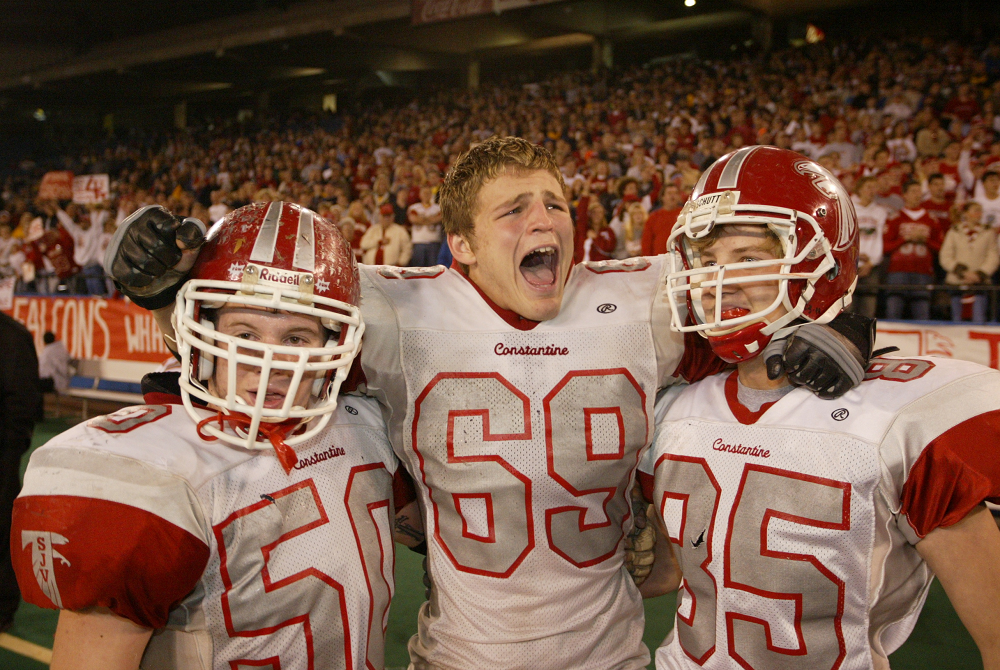
Constantine Celebrates 100th Season, Renowned for Continuity & Signature Wing-T
By
Scott Hassinger
Special for MHSAA.com
September 6, 2023
CONSTANTINE – Bennett Vandenberg and Cohen McGee are just like any other high school football players.
 Both Constantine seniors have high aspirations of winning a fifth-straight Southwestern Athletic Conference Lakeshore title and reaching the postseason.
Both Constantine seniors have high aspirations of winning a fifth-straight Southwestern Athletic Conference Lakeshore title and reaching the postseason.
But Vandenberg and McGee, along with their Falcons teammates, will be celebrating more than victories and a potential playoff appearance this fall.
Constantine, a community located in southern St. Joseph County, is observing the 100th season of the school's football program.
The Falcons (1-1) will commemorate the occasion Saturday, Oct. 7, with a home game against SAC Lakeshore foe Kalamazoo United. Kickoff time from Sweetland Stadium is 1 p.m. The game will be followed by a community luncheon and program in the high school at which time past coaches, players and the program's biggest accomplishments will be recognized and celebrated.
Vandenberg, a starting fullback/tight end and outside linebacker, and McGee, an offensive lineman and linebacker, are both looking forward to the rest of the season and continuing Constantine's strong tradition on the gridiron.
"We have a huge football tradition here at Constantine. This year we're celebrating the 100th year, and we have some of the oldest living players coming back to help celebrate after that game with United,” said Vandenberg, a three-year starter and Finals placer his junior year in wrestling and track & field. “Our community is all about football. We know we have to go out there and represent our school and community the right way."
McGee is following in the footsteps of his older brother Carter.
"There are lots of things that people who follow Constantine football don't see, like the hours of dedication and work we put in during the offseason. That's where we make our strides and become better as a program," McGee said.
The football stadium at Constantine is named after Dr. George Sweetland, a physician in the community, who donated money for a football stadium to be built with a hill completely circling the facility.
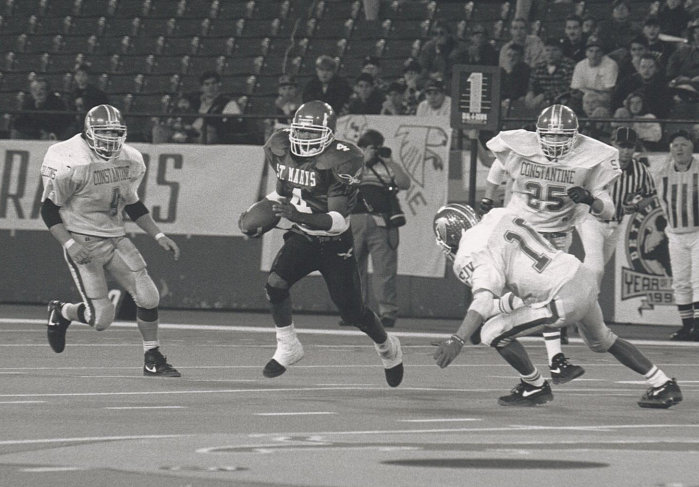 Sweetland, who moved to Constantine in 1916 to take over his brother's medical practice after the latter was killed in a car crash, reportedly allowed patients to work off their medical bills by helping with the stadium's construction.
Sweetland, who moved to Constantine in 1916 to take over his brother's medical practice after the latter was killed in a car crash, reportedly allowed patients to work off their medical bills by helping with the stadium's construction.
Constantine, which played its first football game in 1924 and finished as county champs at 4-2 under coach Lew Lake, sports an all-time record of 481 wins and 221 losses with 11 ties. During that span, the Falcons have enjoyed 11 unbeaten seasons, including Robert Finlay's 1937 squad that went 8-0 and was unscored upon.
Coaching longevity is one of the biggest factors allowing Constantine to be as successful as it has been, especially during the program's modern era. The Falcons have had just four head coaches since 1964.
Mike Messner, a three-sport athlete and 1965 Constantine graduate, later served as the school's athletic director from 1992-2016.
Messner pointed to Meredith 'Spud' Huston, Constantine's football coach from 1958-1961, as one of the first individuals influential in setting the wheels in motion for the program's future success.
Huston guided the Falcons to their first league title in 1961.
Constantine's four winningest coaches – Dave Horn, Tim Baker, Ken Rimer and Shawn Griffith – are all honorary members of the Michigan High School Football Coaches Association's Hall of Fame.
Horn, who died earlier this summer, served two stints as Constantine's head coach from 1964-1981 and 1987-1989 while compiling a 116-65-4 record.
Baker (129-30) coached Constantine for 15 seasons and guided the Falcons to a record of 129-30. Under Baker, the Falcons were Division 6 champs in 2004 and Finals runners-up in 1994 (Class CC) and 2002 (Division 5).
"Dave (Horn) was a genuinely great person who coached 21 years. He could get upset at you on the field, but he was a very kind, storyteller and a thoughtful guy who really cared about others," Messner said.
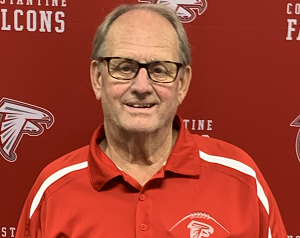 "In the modern coaching era, Tim (Baker) really believed in lifting weights, making kids stronger and developing kids into good football players. He was diligent, hardworking and put a lot of time into the program while missing a lot of family functions. He concentrated on doing the best job he could. Ken (Rimer) was right there in the same mode as Tim. When they started coaching together, they wanted a program that kids at Constantine could be proud of. Things started really happening, and ever since then the program has been strong. We have coaches who want Constantine to be successful on the field."
"In the modern coaching era, Tim (Baker) really believed in lifting weights, making kids stronger and developing kids into good football players. He was diligent, hardworking and put a lot of time into the program while missing a lot of family functions. He concentrated on doing the best job he could. Ken (Rimer) was right there in the same mode as Tim. When they started coaching together, they wanted a program that kids at Constantine could be proud of. Things started really happening, and ever since then the program has been strong. We have coaches who want Constantine to be successful on the field."
Rimer spent 28 years as an assistant coach under Baker and current head coach Shawn Griffith. Constantine compiled a win-loss mark of 242-70 with Rimer as an assistant.
Griffith, who took over as Constantine's head coach in 2005, is the Falcons’ all-time winningest coach at 156-53. Under Griffith's tutelage, the Falcons have made 17 playoff appearances, with back-to-back Division 6 runners-up finishes in 2011 and 2012.
"The history of Constantine football kind've coincides with everything else here in the community. This is my 32nd year overall as a coach in this program. But I also have several memories from when I was in high school at Mendon as a player going up against Constantine," Griffith said.
"When you talk about any community our size, you immediately look at family names. We have another Stears (Lucas) on this year's team. Mike (Messner) told me there have been over 20 from the Stears family that have worn the Falcon uniform. It doesn't stop there. I look at the number of kids we have in the locker room this year, and I realize that I've coached many of their brothers, fathers and uncles. We look at the program as one big family. This program has helped to raise a lot of young men in the area these last few years. The community has been extremely supportive of the program as well."
Constantine won 19 league championships as a member of the St. Joseph Valley League from 1952-2007. That league consisted of Constantine, White Pigeon, Schoolcraft, Centreville, Colon, Climax-Scotts, Burr Oak and Mendon. Bronson and Battle Creek St. Philip became members later after Climax-Scotts and Burr Oak left to join the Southern Central Athletic Association. Eventually, the SJV disbanded due to conference realignment and declining enrollment among its smaller schools.
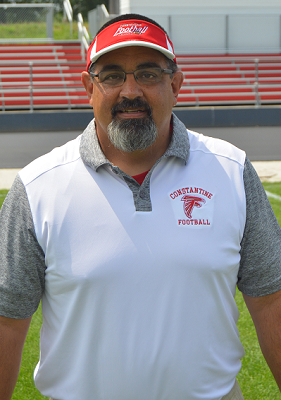 At one time, Constantine played in one of the longest-running rivalries in state football history. The Falcons and archrival White Pigeon began playing one another in 1924 and Constantine held a 47-35-6 in the rivalry, with wins in the final 17 meetings before the series ended after the 2007 season.
At one time, Constantine played in one of the longest-running rivalries in state football history. The Falcons and archrival White Pigeon began playing one another in 1924 and Constantine held a 47-35-6 in the rivalry, with wins in the final 17 meetings before the series ended after the 2007 season.
Messner recalls the 1981 meeting between White Pigeon and Constantine as one of the most memorable. The game was played at the Sweetland Stadium in Constantine, and there were more than 5,000 people in attendance.
"White Pigeon came into that game unscored upon and ranked No. 1 in the state. We were undefeated, but nobody was saying anything about us, but they were really talking (White Pigeon) up," Messner said. "(White Pigeon) had brought over 1,000 balloons with them and hid them behind the bleachers. They were going to launch them every time they scored. They never scored, and we beat them 21-0. It was such a sad moment for both schools when they had to stop playing one another in football."
After the SJV dissolved, Constantine and Schoolcraft became members of the Kalamazoo Valley Athletic Association from 2008-2014 before leaving to join the Southwestern Athletic Conference for the 2015 season. Constantine begins its ninth season competing in the SAC Lakeshore against the likes of Watervliet, Allegan, Kalamazoo United, South Haven and Parchment.
Messner also lists several playoff games as big moments in Constantine's football history.
"Our first playoff team (1991) was a big year, and our first state finals appearance (1994) was another," Messner added.
Constantine lost to Orchard Lake St. Mary's (35-7) in the 1994 Class CC Final, but knocked off heavily-favored Fennville (50-0) in their Pre-Regional and Whittemore-Prescott (54-6) in a Semifinal to get there.
"Both teams were considerably bigger than us up front on the line. Fennville had a really good quarterback (Frank Alfieri) and Whittemore-Prescott had a great tailback (Tom 'Touchdown' Tyson) that our much smaller guys managed to shut down," Messner said. "Then there was a 13-7 win we had in the 2002 Regional Finals over heavily-favored Muskegon Oakridge."
But perhaps the 2004 Semifinal deemed 'The Miracle in Marshall' will go down as the most memorable game in Constantine history. In that contest, Constantine trailed Monroe St. Mary Catholic Central 27-14 with a little more than six and a half minutes to go in the fourth quarter.
The Falcons scored twice during those last few minutes, including a last-second 32-yard TD pass from Aaron Baker to Sean Wolf caught in the end zone that tied the game at 27-27 with one second left. Jordan Williams booted the PAT as time expired, giving the Falcons a 28-27 win.
Constantine went on to defeat Suttons Bay 34-13 in the Division 6 Final the following week.
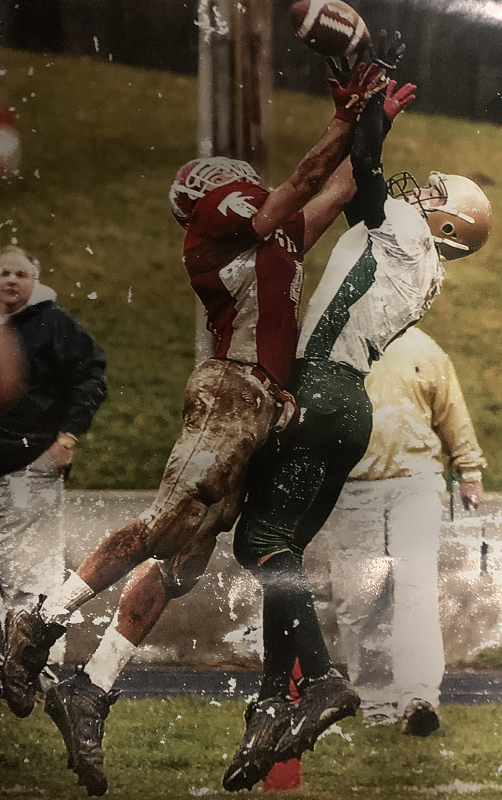 From 1991-2015, Constantine attained at least seven wins for 25 consecutive years, which is a state record. The Falcons made 18 consecutive playoff appearances from 1999-2016 before suffering their most recent losing season in 2017, when they finished 3-6.
From 1991-2015, Constantine attained at least seven wins for 25 consecutive years, which is a state record. The Falcons made 18 consecutive playoff appearances from 1999-2016 before suffering their most recent losing season in 2017, when they finished 3-6.
Constantine's overall playoff record stands at 49-25 with 26 total appearances.
It was Griffith, who played his high school football at Mendon for Class D championship-winning coach Roger Smith and his then-assistant John Schwartz (who would later lead the Hornets to 10 more Finals titles) who convinced Baker the Falcons should transition from the I-Formation to the Wing-T offense.
After much discussion and argument among the coaching staff, Baker reluctantly agreed to Griffith's idea.
"I joined the coaching staff in 1992 as offensive coordinator. As a coaching staff, we really came into our own and made our first run to the Finals in 1994. In the late ’90s we had some really good teams, but still didn't quite have a real identity. During that time we ran into some really good Wing-T football teams," Griffith said.
"We started noticing that we had a real hard time stopping these teams that ran the Wing-T like Muskegon Orchard View, Hopkins and Battle Creek Pennfield. So I came to Tim (Baker) after the 2001 season with the idea of changing the offense. We knew we had a tremendous group of running backs coming up through the program for the next seven or eight years. I approached him about running the Wing-T. He wasn't real receptive at first about running it. But after sitting down with other Wing-T coaches like John Shilito (Muskegon Orchard View) and Irv Sigler (Belding), he agreed to give it a try."
Constantine began running the Wing-T at the start of the 2002 season.
"Once you get known for running an offense like this, it kind've becomes your niche. I get emails from people all over the United States wanting me to come teach them this offense at camps. Here at Constantine, we've been fortunate to rack up quite a few wins since we installed this offense. Our kids can really talk the Wing-T game, and we didn't really have that before when we were running our I-formation and single-back stuff," Griffith said.
"The blocking schemes have become ingrained in our kids. They do a great job of knowing where they are supposed to be and who they are supposed to block. Another thing I really like about the Wing-T is it's a lineman's offense. Our linemen get a lot of credit, which they deserve. There is a certain toughness to this offense as well. It's allowed us to use kids who might be smaller and less athletic, but still allows us to be successful because they have developed a certain toughness."
Griffith credits a lot of that toughness to his players who compete on the Falcons' wrestling team during the winter sports season. Constantine’s wrestling program also has enjoyed a long run of success, including a Class C-D title in 1993 and Division 3 runner-up finish in 2002. The Falcons have won Team Regional titles three straight seasons.
 Scott Hassinger is a contributing sportswriter for Leader Publications and previously served as the sports editor for the Three Rivers Commercial-News from 1994-2022. He can be reached at [email protected] with story ideas for Berrien, Cass, St. Joseph and Branch counties.
Scott Hassinger is a contributing sportswriter for Leader Publications and previously served as the sports editor for the Three Rivers Commercial-News from 1994-2022. He can be reached at [email protected] with story ideas for Berrien, Cass, St. Joseph and Branch counties.
PHOTOS (Top) Constantine players celebrate near the end of their 2004 championship win at Pontiac Silverdome. (2) A trio of Constantine defenders pursue Orchard Lake St. Mary’s Phil Martin (4) during the 1994 Class CC Final. (3) Longtime Constantine athletic director Mike Messner. (4) Current Constantine head varsity coach Shawn Griffith. (5) The 2004 “Miracle in Marshall” remains one of the most memorable games in Constantine football history. (Finals photos from MHSAA archive. “Miracle in Marshall” photo by Dick Carter. Messner and Griffith photos gathered by Scott Hassinger.)
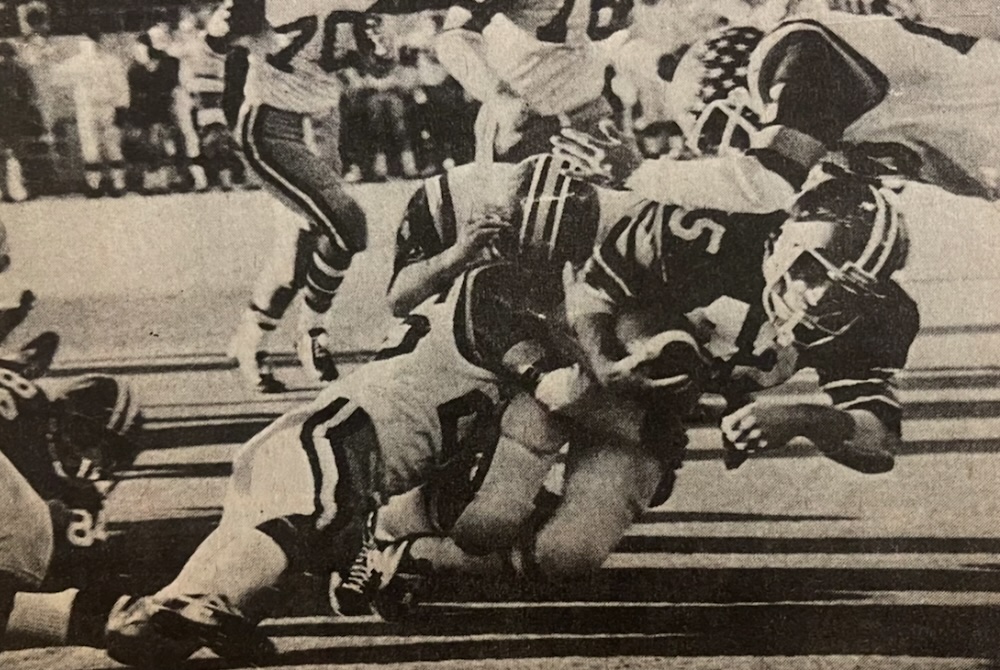
Memories Don't Fade for 1st MHSAA Class A Champion Franklin
By
Brad Emons
Special for MHSAA.com
November 8, 2024
Even after 50 years, Tim Hollandsworth recalls Livonia Franklin’s run to the first MHSAA Class A football playoff championship like it was yesterday.
Before 5,506 fans at Western Michigan University’s Waldo Stadium, the unranked Patriots capped a season for the ages by upending heavily favored Traverse City for the 1975 title, 21-7.
“It was a once in a lifetime event, and I guess it just brings back great feelings winning that game obviously,” said Hollandsworth, who went on to become an all-Mid-American Conference linebacker at Central Michigan. “What I remember most was carrying that trophy around on the field. Myself, Jim Casey and the whole team ... we paraded it out Stanley Cup-style in front of our fans, and everybody was going crazy. Just a happy time.”
The championship game was played on a frigid Nov. 22 afternoon in Kalamazoo, just 12 years following the assassination of President John F. Kennedy.
“When I think about that game, the first thing that comes to mind is that it was a cold, cloudy day before the game,” Hollandsworth said. “And as the game started, the sun came out; it was really bright. It turned out to be a bright, sunny day, and we didn’t feel the cold at all. The adrenalin was pumping.”
No. 2-ranked Traverse City, coached by Jim Ooley, entered with a high-powered offense averaging 34 points per game. The Trojans featured the running back tandem of Rick Waters (1,300 yards) and Bruce McLachlan, along with tight end Mark Brammer, a two-time All-American at Michigan State who later played five seasons for the Buffalo Bills in the NFL.
Franklin took a 7-0 lead in the first quarter when Dennis Smith, the holder on a 30-yard field goal attempt by Sam Williams, couldn’t secure the snap from center but alertly got up and tossed a 17-yard TD pass to Rick Lee.
The Patriots then went up 14-0 in the second quarter on a 3-yard TD run by Casey, who went on to play four seasons at Ball State as a defensive back.
Traverse City cut the deficit to 14-7 before halftime on a 2-yard TD run by McLachlan, but the Patriots put it away in the final quarter on a 9-yard TD run by Casey, who finished the game with a hard-earned 105 yards on 24 carries.
Hollandsworth, who also starred in the backfield with Casey, severely twisted his ankle in the first half and was limited to playing only defense for the remainder of the game. Fortunately for Franklin, Tom Smith took his place and helped continue the offensive surge.
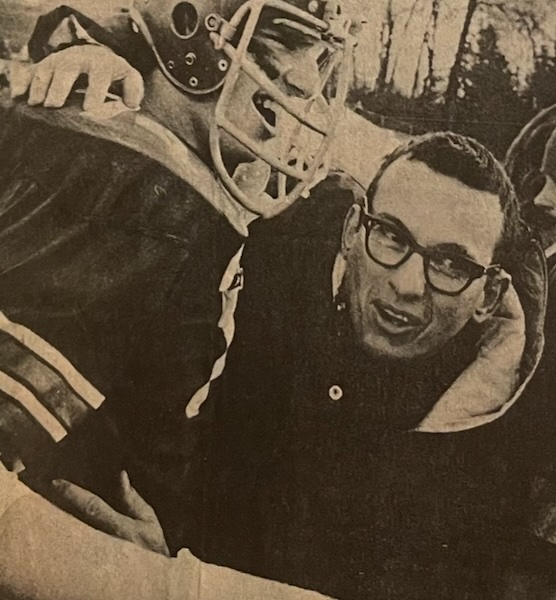 “It was just the fact that everybody was just stepping up when they had to have them,” Casey said. “I think it kind of exemplified everything we did throughout the year to get there. That’s what was so cool about the whole deal.”
“It was just the fact that everybody was just stepping up when they had to have them,” Casey said. “I think it kind of exemplified everything we did throughout the year to get there. That’s what was so cool about the whole deal.”
Meanwhile, Waters – who later became Hollandsworth’s friend and teammate at CMU – led the Trojans’ rushing attack with 85 yards rushing on 19 carries.
Franklin’s defense played a pivotal role in the win with four interceptions – one each by Hollandsworth, Chuck Hench, Jerry Pollard and Casey (his 10th of the season).
Williams, the Patriots’ star tight end and middle linebacker and the son of former Detroit Lions “Fearsome Foursome” defensive end Sam Williams Sr., also batted down a key fourth-down pass in the end zone to thwart a Traverse City scoring threat.
“It’s funny about the whole game ... you forget about the details, it’s crazy,” Casey said. “It was everybody coming together. There may have been some mistakes along the way. That just happens during the game and we hung in there, did what it took to score enough points to win.”
The game was played on artificial turf, not real grass, which was also a first for both teams.
“I think it had been raining the day before ... anyhow, the field was soaked,” Casey said. “And all it takes is to fall on a field that is soaked on an Astroturf field and everything, and all your clothes are soaked. I remember in the first half – I couldn’t wait for halftime to go inside and warm up.”
During the practice week prior to the title game, the Patriots were able to get acclimated when athletic director and assistant coach George Lovich made a deal to practice on the University of Michigan’s artificial surface.
“We had to get new shoes because nobody had played on artificial turf in high school back then,” Casey said. “They had a bunch of used shoes from the (U-M) team. They threw them in a big old box and they let us practice one night on their Astroturf. We went in and got our shoes and we were ready to play – excited about that. It was just different compared to regular grass. It felt super-fast.”
With only four spots per Class up for grabs in the inaugural MHSAA playoffs, five unbeaten Class A teams did not make the postseason including Warren Fitzgerald and Mount Clemens Chippewa Valley from Region 1, Trenton in Region 3, and Grand Rapids Union and Marquette from Region 4.
On the final Saturday of the regular season at Eastern Michigan’s Rynearson Stadium, No. 1-ranked Birmingham Brother Rice (Region 2) was upset in the Catholic League championship, 7-0, by Dearborn Divine Child, which went on to claim the Class B title.
That allowed the 8-1 Patriots, who had lost to rival Livonia Stevenson 13-9 in Week 2, to sneak into the playoffs just ahead of the previously-unbeaten Warriors.
“We were all in the stands watching that game,” Hollandsworth said. “And our coach, Armand Vigna, had all our points figured out right to the point where he said if Brother Rice were to lose, we were in. So, we’re sitting in the stands and Detroit Southwestern is off to our right a little bit higher in the stands. When Divine Child won that game, we were just going crazy and you could see Southwestern wondering who we were and what was going on.”
During the build-up to the Class A Semifinal game against Franklin, Southwestern coach Joe Hoskins was quoted in the Detroit newspapers as saying, “Livonia who?”
Southwestern was led by all-state QB Mike Marshall (MSU), along with junior tackle Luis Sharpe (UCLA), an eventual first-round NFL pick who played 13 seasons with the St. Louis, Phoenix and Arizona Cardinals.
And in that Semifinal at Pontiac’s Wisner Stadium before 5,000 fans, Franklin upended the No. 3-ranked Prospectors, 12-9, as Casey ran for 145 yards on 27 carries. Hollandsworth added a 1-yard TD to cap a nine-play, 72-yard drive and give his team the lead 9-7 at the half.
Southwestern got an 18-yard TD pass from Marshall to Andrew Williams and scored on a two-point safety when the Patriots fumbled the kickoff to start the second half.
Williams, however, booted a pair of field goals, including the game-winning 28-yarder to break a 9-9 deadlock for the Patriots after they were aided by a pass interference call followed by an unsportsmanlike conduct penalty, which took the ball to the Southwestern 18.
In protest, Hoskins took his team off the field and had to be coaxed by MHSAA officials to bring his players back to finish the game.
“I think we were excited about the playoffs because we were undefeated the year before, so were looking forward to getting into the playoffs,” Hollandsworth said. “It was deflating when we lost; it was low-scoring, tough battle versus Stevenson. All the Livonia games (vs. Churchill and Bentley) were tough battles. It was the first game that Sam Williams was out. He got hurt in the (Dearborn) Fordson game before that (the opener) and Sam was not only our tight end, and starting middle linebacker, but he was also our punter and kicker. I think we passed up some field goals in that Stevenson game because we were so unsure of our kicking game.”
PHOTOS (Top) Livonia Franklin’s Jim Casey (45) plows ahead during the 1975 Class A Final as Traverse City tacklers converge. (Middle) Franklin coach Armand Vigna, right, shares an embrace with lineman Rick Kruger in the moments after their team’s championship victory. (Photos courtesy of Hometown Life, which includes the former Livonia Observer).

